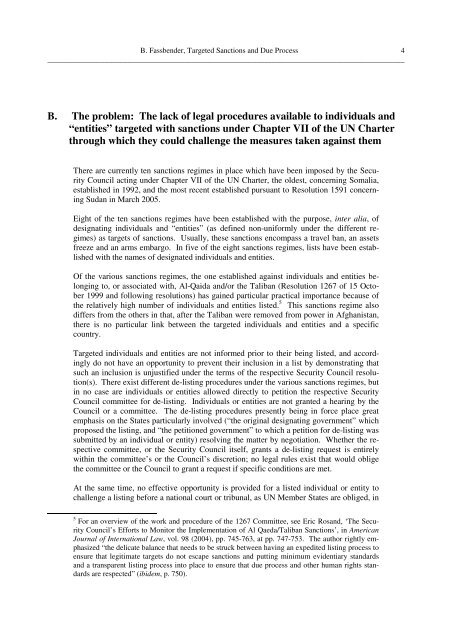Targeted Sanctions and Due Process - United Nations Treaty ...
Targeted Sanctions and Due Process - United Nations Treaty ...
Targeted Sanctions and Due Process - United Nations Treaty ...
You also want an ePaper? Increase the reach of your titles
YUMPU automatically turns print PDFs into web optimized ePapers that Google loves.
B. Fassbender, <strong>Targeted</strong> <strong>Sanctions</strong> <strong>and</strong> <strong>Due</strong> <strong>Process</strong><br />
4<br />
______________________________________________________________________________________________<br />
B. The problem: The lack of legal procedures available to individuals <strong>and</strong><br />
“entities” targeted with sanctions under Chapter VII of the UN Charter<br />
through which they could challenge the measures taken against them<br />
There are currently ten sanctions regimes in place which have been imposed by the Security<br />
Council acting under Chapter VII of the UN Charter, the oldest, concerning Somalia,<br />
established in 1992, <strong>and</strong> the most recent established pursuant to Resolution 1591 concerning<br />
Sudan in March 2005.<br />
Eight of the ten sanctions regimes have been established with the purpose, inter alia, of<br />
designating individuals <strong>and</strong> “entities” (as defined non-uniformly under the different regimes)<br />
as targets of sanctions. Usually, these sanctions encompass a travel ban, an assets<br />
freeze <strong>and</strong> an arms embargo. In five of the eight sanctions regimes, lists have been established<br />
with the names of designated individuals <strong>and</strong> entities.<br />
Of the various sanctions regimes, the one established against individuals <strong>and</strong> entities belonging<br />
to, or associated with, Al-Qaida <strong>and</strong>/or the Taliban (Resolution 1267 of 15 October<br />
1999 <strong>and</strong> following resolutions) has gained particular practical importance because of<br />
the relatively high number of individuals <strong>and</strong> entities listed. 5 This sanctions regime also<br />
differs from the others in that, after the Taliban were removed from power in Afghanistan,<br />
there is no particular link between the targeted individuals <strong>and</strong> entities <strong>and</strong> a specific<br />
country.<br />
<strong>Targeted</strong> individuals <strong>and</strong> entities are not informed prior to their being listed, <strong>and</strong> accordingly<br />
do not have an opportunity to prevent their inclusion in a list by demonstrating that<br />
such an inclusion is unjustified under the terms of the respective Security Council resolution(s).<br />
There exist different de-listing procedures under the various sanctions regimes, but<br />
in no case are individuals or entities allowed directly to petition the respective Security<br />
Council committee for de-listing. Individuals or entities are not granted a hearing by the<br />
Council or a committee. The de-listing procedures presently being in force place great<br />
emphasis on the States particularly involved (“the original designating government” which<br />
proposed the listing, <strong>and</strong> “the petitioned government” to which a petition for de-listing was<br />
submitted by an individual or entity) resolving the matter by negotiation. Whether the respective<br />
committee, or the Security Council itself, grants a de-listing request is entirely<br />
within the committee’s or the Council’s discretion; no legal rules exist that would oblige<br />
the committee or the Council to grant a request if specific conditions are met.<br />
At the same time, no effective opportunity is provided for a listed individual or entity to<br />
challenge a listing before a national court or tribunal, as UN Member States are obliged, in<br />
5 For an overview of the work <strong>and</strong> procedure of the 1267 Committee, see Eric Ros<strong>and</strong>, ‘The Security<br />
Council’s Efforts to Monitor the Implementation of Al Qaeda/Taliban <strong>Sanctions</strong>’, in American<br />
Journal of International Law, vol. 98 (2004), pp. 745-763, at pp. 747-753. The author rightly emphasized<br />
“the delicate balance that needs to be struck between having an expedited listing process to<br />
ensure that legitimate targets do not escape sanctions <strong>and</strong> putting minimum evidentiary st<strong>and</strong>ards<br />
<strong>and</strong> a transparent listing process into place to ensure that due process <strong>and</strong> other human rights st<strong>and</strong>ards<br />
are respected” (ibidem, p. 750).
















